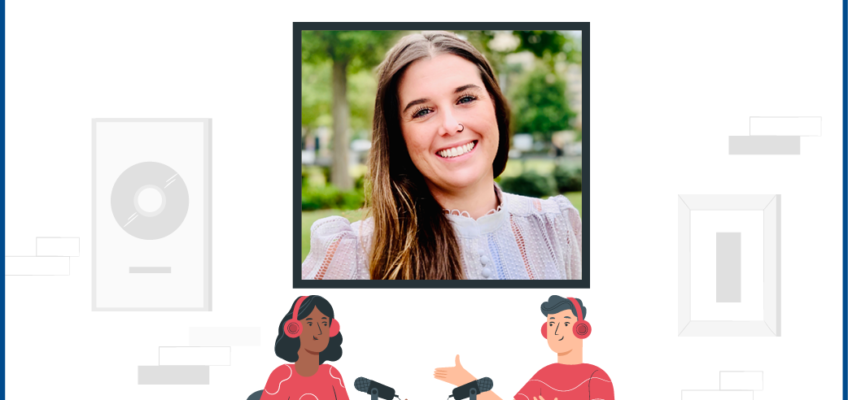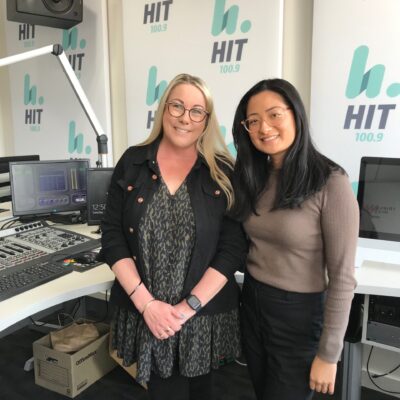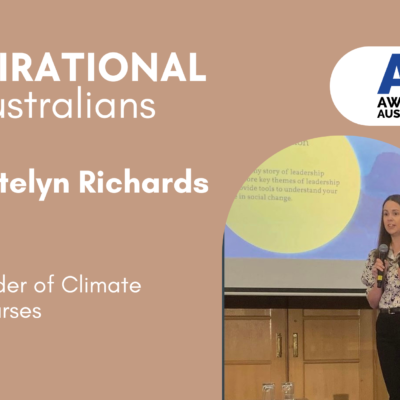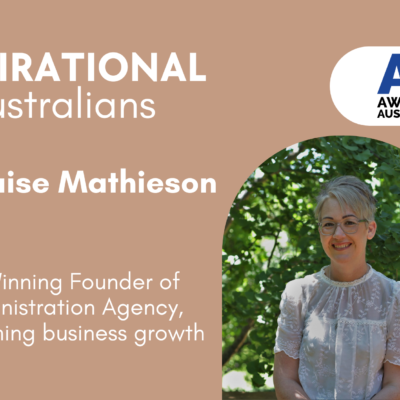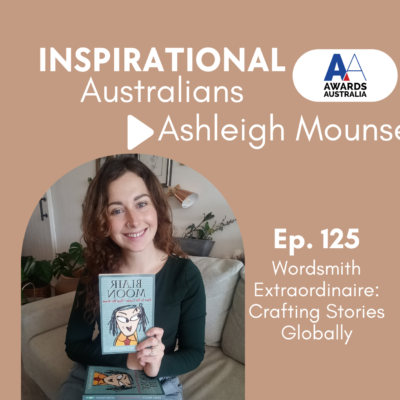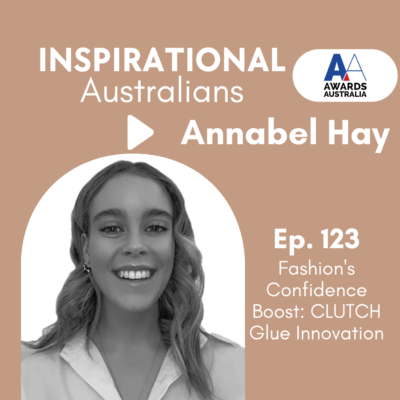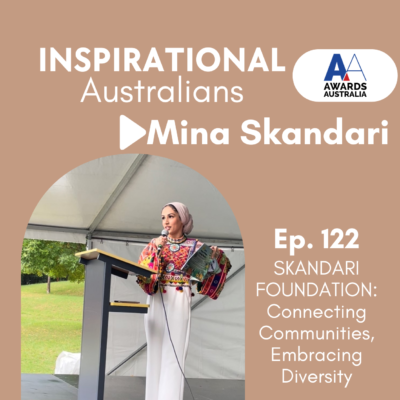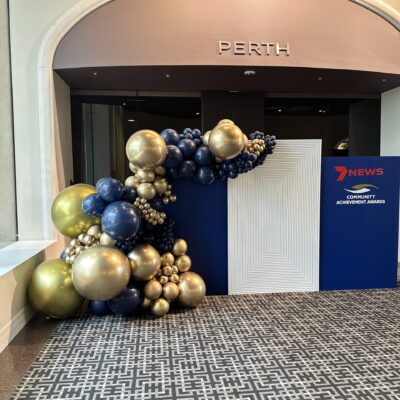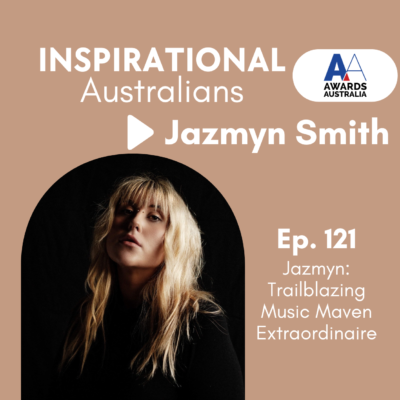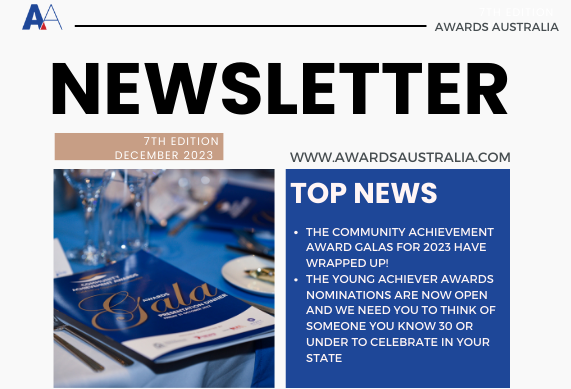In this week’s episode, Josh is talking to Brittany Ward who was a Finalist in the 2017 NT Young Achiever Awards.
I am an American by birth but Australian by heart. I moved to Australia in 2012 only one week after graduating University. I originally came to Oz to play basketball – I played in Perth, Darwin, the Gold Coast. I even lived in NZ for a brief period of time when I over-stayed my visa.
But as Territorians say, you’ll be back…you always come back to Darwin. And it’s true. I got married and started setting roots in Darwin by investing in the youth, particularly the underserved and at-risk youth.
I started by founding the first all-abilities basketball program in the Territory called Rising Stars. This filled my heart with so much joy, that I expanded on my mission to be the light in this world and started working for Midnight Basketball which is now called Launch Basketball Night Series. I’m passionate about using sport as a vehicle to drive change in a young person’s life. I know how impactful being a part of a team is, because sport in fact changed my life. Also, every program I created or was a part of had to eliminate barriers to access- meaning everything needed to be FREE to the participants.
Moving back to the states, I have continued my work in youth development and empowerment by working for a non-profit called the Oklahoma City Police Athletic League. Our sports programs are free of charge to all PAL participants, and we serve nearly 1500 young people year over year.
In this episode:
- We hear how Brittany asked the Palmerston businesses and schools to volunteer for 2 hours each to make the Rising Stars Basketball league a reality
- Brittany encourages us to never give up on our dream and to keep fighting the good fight and don’t give up – it will happen
- We learn about the important work of the Stars Foundation, a holistic program that supports Indigenous girls and young women to attend and remain engaged at school, complete Year 12 and move into full-time work
Links
Connect with Brittany on LinkedIn
Check out the Rising Stars on Facebook
Want to know more about the Stars Foundation – check out the website
Want to know more about Midnight Basketball, Darwin – check out the website
Want to know how to Rate and Review a podcast, see this article
Follow us on our Inspirational.Australians Instagram Page
Want to nominate someone? (It can take as little as 2 minutes to recognise someone making a difference)
Like some more information on Corporate Partnership?
Transcript
Welcome to the inspirational Australian’s podcast, where we chat to people making a difference in their communities and in the lives of others. And here’s your host for today, Josh Griffin. Thank you, Annette for that intro. So welcome everyone. And before we get into today’s interview in your weekly dose of inspiration, just wanting to let everyone know that we’ve got our Young Achiever Awards at the moment in full swing, some of our states are wrapping up and the others are about to do so with our gala dinner events. So for your local state, go on Facebook, check out the 7NewsYoung Achiever Awards, and have a look at who’s been winning, who the finalists are there some great stories and we’re getting great video content out there to share these awesome stories with you. So please go have a look, and as always, if you know an inspirational Australian that you think we should interview, let us know email us info@awards australia.com. And always make sure you’re checking the inspirational Australians Instagram page for a bit more features on people. We’re interviewing straight into it this morning. It’s morning for me. It’s evening for my guest, Brittany Ward, who’s joining us from Oklahoma, which is very cool. And we met britney in Darwin as part of the Northern Territory Young achiever awards, and Britney has a history. Sounds funny to say that way. Sounds like a bad thing. She’s got a great track record of working with young people. And I’m really excited to hear more about what she’s doing at the moment in Oklahoma as well as touching base a bit on on what she started in Darwin, which is still going on today. So Britney, welcome. Hi, thank you so much for having me on. I’m really grateful to be here. No, no worries. Also me the second person I’ve interviewed who is outside of Australia, one in London. And now you in Oklahoma, so it’s very cool. We’re ticking off some extra countries. Even though you’re an American, you know, we’re claiming you as an Australian because you lived there for a long time. And so thank you. I am Australian by heart, but American by birth for sure. Fair enough. Well, can you tell us a little bit about how you came to Australia from America in the first place and what’s brought you back? So in 2012 I played my last collegiate basketball game and any person that’s played sports knows how devastating it is when you kind of realize that it’s over. And I remember I was walking back onto our team bus and my coach handed me my cell phone. We have to turn them in before games. And I had a text message from one of my former teammates who was already playing in Australia . And she said, hey, do you still want to hoop after college? If so there’s a spot open for you. And it just sort of spiraled the next month, was such a whirlwind of back then we were using It’s not zoom. I can’t remember the name of the Skype. Yeah. I, I was Skyping being with my host family and Learning more about the team that I was going to be playing on. And a week after I graduated college, i moved to Australia. Well, yes, I got on a big plane and I was living in Dallas at the time with my family. And I travelled halfway around the World to play basketball in darwin. And it was really funny because my mom watched some special on discovery and I was like, man watching that doesn’t make you some knowledge. nature expert of all things. Australian, you know, like, you don’t know. turns out she’s right. There’s like every deadly thing possible in Australia. So I get to Darwin and they’re like, oh no, you can’t swim in the water is like what that’s so funny. And you know what, from, from what I understand of how Australia is represented in, in the states and other countries. Darwin is the most accurate version of that. Because there is wild precedent everywhere and everyone’s like, oh, there’s crocodiles, you come to Melbourne where I am. No, there’s nothing that this spot is, there’s spiders I suppose, but yeah, Darwin, you’re right, it’s a hectic place, but in a good way, a lot of good stuff there too. Yes, it is the proper outback and I loved it for that. So after I moved to Australia, I mean mostly to play basketball over a period of time I, I would say, so I played in Darwin and then I played in Perth. And then I moved to the Gold Coast and played on the Gold Coast. And somewhere in between there, I overstayed my visa and had to stay in New Zealand for a month, couches are really, so that’s interesting, maybe a story for another time. And then I after the Gold Coast more or less committed to the relationship that I was in and we got married. So I actually got permanent residency to Australia through my marriage pen. And I moved back to Darwin and really just focused on getting back to my community. I felt so empowered by basketball, it changed my life. I. I wouldn’t have gone to college. My family couldn’t have afforded for me to go to school. If I didn’t get a scholarship and so basketball has always just been this really awesome tool for me to get an education and also travel the world. And I just feel this immense, like give back sensation, right? It’s given me so much, it’s only right that I pay that forward. And so I started using sport as a vehicle to impact young people. And that started really as volunteer work in our Don Dale juvenile detention centre up in Darwin. On a Saturday, i’d go and play basketball with the boys and Girls and just talk about life as well . It’s amazing what young people will tell you when you meet them where they’re at . And so from there it just really blossomed into working for a program called Midnight Basketball and that is still running, which is really exciting. And also the Rising Stars Basketball program, which is in all abilities basketball program. The, the story around the Rising Stars Basketball program is really special, and so I wanted to give it its own moment. My dog is making noises. I’m so sorry. That’s all I was. Sorry. What kind of dog have you got? He’s actually from Australia really. I brought him back with me from Australia. He is a Snappy Pit mix. Yeah. He is Australian born, but American named so it’s a little bit funny. He’s named after a Texas ranger. What’s his name? Beltre after Adrian Beltre. He’s Mr. 3000 of the Texas rangers. Here you go. So three thousands at passing yards or rushing yards. What I’m trying to work out though he thinks is rangers and I got the right spot. Even. Ok. baseball showing my lack of American sports knowledge. That’s ok. No worries. Yeah. Right. So yeah, ah, sorry. I was just going to say it’s not unusual for a dog to be interrupting the podcast. It’s fine my dogs on it. A few weeks ago we had Amy Heatherington who also was a Darwinian and I love her. I know, yeah, yeah. Amy is a legend. She was on the show and her dog was making appearances, multiple appearances. So it’s totally fine. Sorry. Rising stars. I’ve got a question before we get there? Yeah, you dropped it very casually. I was playing basketball when I started volunteering with kids in a juvenile center. You know, how does that happen? Because it’s not something most people would think to do. Is it something that you had heard of? Someone mentioned it to you and you thought, oh yeah, don’t do that. Ok. So then we’re going to have to turn back the time clock a little bit and go back to college. And I guess my passion for working with youth really began there. And I, I didn’t realize it until there was a young lady from a young woman from England playing on our soccer team. And she sort of developed this community outreach program for our university. She spearheaded that whole thing. And then as she was getting closer to graduating and moving on, she passed it on to me. And so I became this liaison between our athletic department and the greater Austin community. And so I had to do like drug tests and background checks and all these other things to be representative of both the organization and our, our, our athletic department at St. Edwards University. But it was so worth it. And we worked with like halfway houses, our juvenile detention center, we worked with some orphanages and even cancer wards with the doe hospital with the children’s wing. And so yeah, that’s really where it started for me, I realized more than half the battle is just putting your shoes on. Right. Like going to the gym, putting your shoes on is the first step and sometimes the hardest. And it’s the same thing with volunteering. You might have had a full day of work, you might have had a a doozy. And the last thing you want to do is give an hour of your time that that precious time to someone else. But man, when you get there and you realize the impact that you’re only your one hour made in that person’s life it’s, it’s really special and meaningful. And so from there I, I know, I know it’s possible and I know the great impact that being a consistent presence in a young person’s life can have. And so that’s why I started going to the Juvenile detention center. I, I like to give people in our community that maybe don’t get an opportunity to share their voice or to be seen. I want to be the person that is able to do that. I want to make them feel seen and heard and valued because I really believe every person is valuable. Everyone has something to offer and bring to the table. You just have to maybe give them the chance to speak it and you have to be open to receive it. And so from there I was a period of time where my host family, her name is Lisa, that’s the mom. And so I was living there and she has two, three daughters, one of which struggles with mobility. I don’t know exactly her medical diagnosis in that, but she was playing in under fourteens basketball league in Darwin. And so I went to watch. And so I’m living with them. And so I’m seeing like the day to day of what it takes to be proactive and that sort of Family environment and to be accepting and loving in that environment. And so I go to basketball and I, and I’m watching her daughter play. Her daughter’s name is Gabby. And the one of two reasons why I started the program and I’m watching her play basketball. And it’s a critical moment for both gabby and the team. Because in darwin, we don’t have a huge population of young people playing sport, just because our population is smaller than in other states. It’s more rural. So it’s a critical time for those young girls on her team to be developing skills and trying out to be on the national side. They were being really inclusive of Gabby and, and really making sure she was able to feel a part of the team. But you could tell that Gabby still still didn’t feel fully a part of it and also struggled to keep up. And so I asked astore mom Lisa, why? Why is she not playing with her friends with her peers? Is there a place where she can go and have her own community and play basketball? And her mom said no, it doesn’t exist. And I said ok, we’ll watch it will from there several months and I had really good backing from an organization called Parba. And so that’s the Palmerston Regional Basketball Association and we just really put our foot on the gas pedal and got out in the community. pounded the pavement, went to different all abilities programs and employers, and said, hey, this is really important for your employees overall well-being. And for their health, we’re asking for you to give two hours out of their work shift or two hours out of their school day to come and participate in this program. And man, it, it bloom did something really incredibly special. I mean, people will come and watch the finals and cry because it’s really, really special to see sports when it’s on a competitive level like this is super recreational. But on a competitive level, we lose so much of that sportsmanship and celebrating even the little victories and rising stars basketball. We had such an opportunity to do that. So maybe in the first week you didn’t dribble any time. You touch the ball, you just ran with the ball. Yeah. But towards the end of the program, you would dribble in between some of your running. That is incredible improvement and that should be celebrated. Also there was a young woman in our program who won rising star of the year and she received that award because towards the end of the program, she was actually using her words and speaking to her peers. Whereas before she, she didn’t, she was selectively mute. She didn’t want to speak to people. And so again, that is a huge celebratory moment that she got to have in front of everyone playing in a community that she felt comfortable in that she felt included and celebrated, obviously gave her the confidence in it to, to start using her words in that way. Which is so cool. Yes. And it made them feel a part of something bigger than themselves. And you know, that’s important for young people, full stop, fallibilities and, and beyond. That is for everyone. And when you have a coach or you have peers like pumping you up and supporting you, that’s incredibly empowering. It’s funny when I saw you finish that thought really? I was just going to say, you know, and in its inception i did receive a little bit of pushback in that basically people are wanting to see improvement. And, and I would say to any point of this podcast is to be inspirational. And so I would say to any of you listening, man, just keep fighting the good fight. It will fall, the pieces will fall into place as they are supposed to keep doing it for the right reason with the, the people that you are serving at the forefront of your mission and how you’re pitching and selling to your community. And it will happen. Don’t give up because, I mean, I’m a testament to that and it does happen. But I was going to say, and that’s actually a really good message just before I say that for almost any activity you’re undertaking, whether it’s something to serve the community, whether it’s a business to serve your customers and clients. If you’re doing it for the right reasons and serving those people first and foremost, living and actually working with your values in mind, then you will be successful because because you’re doing it the right way. You’re right. So there will be challenges. But yeah, it’s a good message, britney. What I was going to say is, you know, you hear some people say, oh no, I don’t like sport or hate sport. And to me there’s two different sports, two different things. You touched on this. There’s a competitive you could say whether it’s professional or not professional, but really competitive. You’re playing in a high level to win or the sport that brings people together that’s enriches communities. And to me, that kind of sport, that I love playing competitive basketball, myself, but that is more rewarding. The community side where you know what you talk about, you’re seeing these improvements in people and you know, just be all smiles at the end of each session, I’m sure. Yes, and they’re literally celebrating the other team will clap and cheer. When, when someone on the opposing team has been struggling to score all game and then they finally score, there’s not a seat in the nets, in the stadium that has a button anymore. Everything up and clearing, every single person is celebrating that point and it’s just a really special thing to be a part of. It’s really heartwarming. So you found out that the Rising Stars must be so you came to town in 2012. Was it around that time, or was it a bit later that you found that tournament? Probably later. And it was much later because I had moved around playing a little bit. So it wasn’t, i think it was in 2015. Yeah. And we had really good support from Lauren Moss. And even when she was the minister for sport, we were able to talk to her about including Rising Stars in their annual budget. And we also, so as I, as I was leaving Australia, I knew I needed, I needed rising stars to continue because the community needed rising stars to continue. And so I went to basketball NT, and ask them to overtake the program, which was both really hard because it’s kind of like your baby, right. You’ve nurtured it and here it’s growing and developing. But I think what makes a good leader is being able to recognize when you’ve taken something as far as you can take it. Yeah. And I wanted to outlive me. And so in order for it to do that, I had to pass it on and sponte are still running it. I’m still listed as the patron of the program. So it’s really cool here. Here I am in Oklahoma City in the United States in 2021 and a pandemic. And can still see videos of the Rising Stars basketball program still happening. So that’s really, really cool for me. And not only is that a sign of good leadership, but that it’s been entrenched in the community because it’s sustainable, it’s still going to this year. So that’s a double really cool thing. I think what we were able to do with that program is build really good relationships with our community partners. And one of them being the Seek to School. And I don’t know if that’s all over Australia or not. But basically it’s a program where young people can go and seek certificates in specialized sports management. And so part of their curriculum is to coach or develop referee skills and we were able to partner with them and use it as a way to empower them to be skilled as well. And so we’re bridging the gap between all abilities and I would say a quote unquote typical student, because there’s such a stigma attached to a person with a disability. Very true. And until you have the experience of interacting with them, I understand that it can be maybe daunting or even uncomfortable. And it’s when you get to be around them in that setting it’s, it really knocks all those barriers down and it creates a level playing field for everyone. It really was a safe and fun environment to foster those sorts of relationship building pieces which was really core to that whole program. And. And like you just said, important for its longevity, i can speak personally just from my own experience that when I started working with these awards back in 2013, i hadn’t been in contact with many people who had a disability, whether physical or otherwise and from I can only speak for myself personally, I was thinking, well, I started meeting people through the awards at the events and thinking ok, how do I interact? Do I look at them to look away? And as you meet people, when you’re talking to them, you realize they’re just humans, they’re just normal people act the exact same as you would with anyone else that you would meet. And that just clears up everything. As soon as you, as a person can make that understanding and again, I think you experience, which is why it’s so important for these programs like you are talking about introducing people from other areas who are getting exposed to different types of situations. Yeah, it’s a the more I hear about it. It just sounds like such a great program so well done and thank you very much. It’s really not just me man, that the community really brought in and helped make it what it is and help it continue. And I get tagged in photos and I just, I can’t say thank you enough to Lisa and her daughter Gabby for being an inspiration. But also there’s a young man named Joseph. And I call him Joe. And he, he’s also a reason why that program began and he’s still playing and now he has a full time job and it’s just really amazing to know that you had just like even the smallest role to play in his development as a, as a person. I’m just really thankful for all of them and all of their support and getting that program off the ground for sure. Still talking basketball, but now connecting it to the young achiever awards that you were a finalist in 2017 and 2016. There was another program you’re involved in called Midnight Basketball. Now, one of my memories of that is because I was at the event, and I can’t remember if it was 2017 or 2016, and I was managing that event. And I remember liaising with you and you’re saying, I think I can come, i’ve got Midnight Basketball that I’m running and we’re looking at the times and I’m all right with your category to the end of the night. And hopefully you can make it at the end. firstly, you tell us a bit about midnight basketball and then your recollection of that event. If you can remember at all. First of all, that is classic Brittany, for sure. It’s hilarious and I love that. That’s one of the things you remember most about me. So Midnight Basketball actually had its inception in the United States, which is really interesting. And it’s its own entity and it’s based out of Redfern, Australia, or that’s where it began. Yeah, yeah. So it’s all of these working parts that come together to for financials and the city of Darwin really took ownership of that program and really made it the success that it became. And Darwin specifically, but also we had really great people. We had such great volunteers in that program that took ownership of it too and had we had such great buy in that man when the adults were excited about it, it just like spreads. Right. And, and it’s really infectious and it gets the kids excited and it gets the surrounding community excited. And so we started getting so sorry, i’ll back up. I get excited. So this program really is targeted towards at-risk 12 to 18 year olds. And we’re our argument was yes, that is a huge range of young people, but the level of play the sport is the vehicle. The sport is the vehicle towards life skills. So on the back of our t shirts it would say no workshop, no jumpshot. So you don’t get to participate in the games if you don’t attend the workshop on the night. And so it was really structured, very structured evening around having a team dinner, having a workshop and playing games with your peers. And once you were in the doors of the stadium, you weren’t all that you were not allowed to leave. So we had security just to really protect the safety of our young people. Because I’m, I’m talking like a fairly high risk young people. Some of them had anklets on, I mean I, I mean we, and those were the young people we want, we want them to be inspired by their peers or be motivated to make a life change or, or just find someone and a consistent positive adult role model that they can talk to about what’s going on in their life. So we had a youth worker on site every night. We had a police presence, but not as police per say, more as a community engagement. In fact, glenn warrior, he was one of our coaches and in fact we actually took a group of young people to sydney to participate in a midnight basketball tournament. We made an all star team and took them out of state, which was really, really fun and rewarding. But back in Darwin, how that program works is you have, you run that tournament twice a year and they’re in eight blocks. And so you run like regular season play and then the last night is like the finals and everyone makes the playoffs. It’s just a matter of seeding. And then the final is really, is fun. And we do like introductions. This might be the only opportunity. These young people get their names called in a basketball stadium. So we do introductions, their first and last names. We have a dj on site, we have people commentating during the game. We have halftime games and skills, challenge for people. Our other young people and any parents or whoever comes to watch them quickly and interject there for people who don’t know basketball. The introductions before the games with a dj, for kids that will just be really cool. I just want to highlight how cool that would be. So, I mean, it is really special to be in the spotlight for a minute and I know there, there’s a bit of shame around that. Especially with working with indigenous people and torres strait islander young people that we were working with in darwin. But it’s, it’s also important to be able to navigate that and to have those sort of skills because when you are joining the workforce eventually you have to sell yourself. You have to be able to Yeah, it was just a really great moment to see our young people getting their names called getting pumped up with a dj and all the fans. Yeah, because for these kids to be shooting around in the, just in the backyard, whatever it is with friends and they’re pretending they’re Michael Jordan and Kobe Bryant, whatever it is. And part of that when you, if you followed any NBA or anything is here is the introductions. It’s like, it’s such a big thing. And so yeah, it was just me that would have pumped him right up. It’s, it’s really important to note that this program was really targeted at the young people that would need it the most. And that’s not to say that we certainly did have other young people involved, that we thought could be really good leaders and gain experience through that process as well. But if english was a second language, if they had just moved to darwin from seeking asylum or if they were in a residential care facility like we, we wanted those young people because they’re the ones that are yearning for someone to see and are yearning for someone excuse my language to give a shit about what happens to them in their lives. And man, our volunteer group just did such a great job and it was such a fun atmosphere even as a volunteer that many people would bring their friends. So our volunteer pool is constantly growing because one friend would bring one friend and they’d bring someone else. And we just really created this environment where everyone felt a part . It was like a big family. It’s awesome. And I would say that we were able to, like I said, make that all star team. And so we traveled there were it was me, Sean, he’s a really great volunteer. Glenn and another Lois and we all took that team to Sydney and stayed in dorms and I’m not even going to be coy about it. Our team was the best behaved they were top notch. When it came down to the finals, there was a bit of an injustice done to our team. And they just rose above and had so much great sportsmanship, so humble and showed so much integrity. I just like I was blown away by them. I was really inspired by the young people they were becoming, it was really, really incredible to see them through adversity. Just rise up. And of course that’s what they do in their everyday lives. They rise up and to see them on that stage in front of all those people in a different place to do that was really inspiring to me. Yeah, it’s super cool. It’s. It shows the yet again, the power of sport and the power of believing in, in people and how they respond when they, they know that they’ve, that they’re being delayed, then that makes sense. Yeah, and I think any person that works with young people knows you are not always going to get a high five. You’re not always going to get a pat on the back. Probably not going to get a thank you. And you just have to trust in the process and know that you’re not always going to reap what you sow immediately. It’s just not going to happen. And you have to accept that and just hope and pray that some of that little nuggets that you sprinkled throughout their stick and help them on their journey into becoming who they’re becoming. I actually started working for the Stars Foundation, which is in a mentorship program that’s now going Australia wide again, a really incredible program run by really incredible people. They also center around four pillars and culture is a big part of that and they serve aboriginal and torres strait islander, young women. And so stars exists to inspire and give some hope for these young women. It was just really wonderful to be a part of that program too. And I had really great mentors and bosses that helped me realize that. Yeah it’s, it’s not always going to be rainbows and sunshine. And it’s not always going to be a pat on the back, but be consistent. Show up, do your job and it will pay off. And I can say that on my way out of the stars foundation i was crying. I cried so hard on the last few days at that job, my girls cried so hard to say goodbye and I got a letter on my desk written privately from one of the girls. And it said to me, just saying thank you so much for coming to school every day and letting me be the first person to say good morning to you. Even though you’re moving away, you come to school so happy. And you show up every single day that makes school a place that I want to be. Thank you. I love you. I mean, I just like melted my heart. So keep up the good fight people. You do meaningful and important work, and I’m going to say it if no one else does. Thank you so much. Keep doing it. That’s brilliant. And it does, it makes, makes your day. It makes you awake. Maybe even more when you get those kind of messages from people. So. So brittany, i’ve got to ask, you’ve told heaps about your work in Australia. What you did here in Australia, when did you head back to the states? Sounds like you’re not from Oklahoma. So yeah, what took you to Oklahoma? At a treatment camp with the stars foundation sitting at a breakfast buffet at a table full of girls and my counterpart mark. And I don’t know what we were talking about. ironically, talking about parents and about having a good relationship with your parents and being respectful. And I got a text message from my mom. And I was like, see, my mom texted me. I’m, I’m twenty seven years old. I still talk to my mom, you know, and I open the message up and it read, hey, I’m ok. The tests have come back negative, but it looks like I’ve had a stroke. And so I’m like, what? So I excuse myself and go somewhere private and call my mom and she’s like trying to whisper, she’s like trying to be like trying to pretend like nothing’s wrong. Yeah. It’s like hey, so I just got your message, are you ok? And she’s like, oh, I didn’t mean to send that to you see what? I need to know that? Yeah, my mom, so my mom has autoimmune disorders, multiple types of them, primarily lupus. And it has caused, so lupus, for those who don’t really know autoimmune stuff, really is like your body, your body’s defenses are attacking your body’s organs, your body is attacking itself. And my mom has to rely on medicine to regulate that, or she could die. And so her medicines and doctor that she was seeing at that time weren’t working and she’d been trying for years to tell him to tell that doctor in North Texas that it wasn’t really a good fit for her. And he would just say, oh, just minimize it, dismiss it, No big deal, that’s part of the process. And so then turned out she had multiple strokes in her sleep and she experienced some temporary paralysis of her face. And now she has permanent double vision. It’s kind of hard for her to see at night. Not so much during the day, but yeah, so at night and so I said to my mom, well I’m this. So I think that was in 2017. I said to my mom, when I come to visit for Christmas, i’m going to take you to a new doctor in Oklahoma City. My aunt actually also suffers from autoimmune diseases or disorders, I should say. And so she sees a really good doctor there. specialists and I want to take you to see him. And so we did and his incredible bedside manner and made my mom feel valued and seen and heard and all those wonderful things. And so now my mom sees a doctor in Oklahoma City. She still lives in Texas, but once a month she’s required to come to Oklahoma City to see her doctor here. What’s that just? Whats the distiance like? I can’t picture in my head with. So my mom lives six and a half hours from where I live. Yeah. Ok Yeah, and it’s not like Australia i have I flew into Sydney and drove from Sydney to Darwin with my good friend once we camped along the way. And you’re talking like cullom, like thousands of kilometres, and on a daily drive, 15 to 17 hour drives and nothing in between, just like desert, right? It’s not like that in America. Every ten, every ten feet, there’s like a gas station or so you don’t have to have your boot doesn’t have to be filled with gas cans and you’re sort of fit on that. But yes, so my mom I moved back to america because I wanted to be closer to my mom. So even though she is six hours away, she’s much closer than two hours on a plane to get here. So that’s why I think back that’s a good reason to do it. Yeah. So then did you find work in Oklahoma rather than in Texas where, where you’re from or how did that kind of all of it? Yeah. initially I was working and training on site as a dental assistant, and so I know so much about teeth that I may never need to know again. So, but it was really interesting and challenged me in different ways. I personally believe that there’s never bad experiences. I don’t know, you can always take something away even if it’s what not to do, you know what I mean? And so a few months i’d say like, eight months into that gig i, this is a really great story actually. I was naked about to get in my shower water running and I get this phone call and I think it’s just like spam or something. So I answer it so I can hang up more or less. And I answer it. And it’s this man that says, hey, what are you doing? I’m just like looking around like a nothing. And this voice and vote on the other end says, you know, this is, this is so and so I, I think there’s this job opportunity, that’s right up your alley. It really goes with everything you told us about what you did in Australia. And I think that this could be a really good fit for me. And it’s like, ok, so I talked to him for 30 minutes naked before getting in the shower because I don’t want to be that. I don’t know if I turn off the water, would you hear it? You know, the water’s going to hold a little paralysed, i just sat there. But so out of that I send in my resume to my former executive director of the Oklahoma City Police Athletic League. And I got an interview and another interview. And as we are today, I am the Chief Operating Officer of the Police Athletic League. Wow, very cool. Yeah, so it’s been a journey for sure. Getting plugged in to the community here, but I am very passionate about that. So that comes pretty naturally to me. So police athletic league, you are coaching, police you are working with. What’s the, what’s the deal? I know everyone, even people here in Oklahoma City think that I make sports leagues for grown as humans, but that’s not the case, right? We serve inner city youth fifth and sixth grade. That’s really cool. We are a part of this larger narrative, this bigger conversation around creating a pipeline into like college or a career path. And so we, we started out in elementary schools, serving third and fourth grade. And then before I, so that’s pre Brittany. That’s before I started at PAL and they created this movement. All these schools just loved power. And so basically we provide sports programs, we provide free of charge to any person that participates. And so that’s seven on seven football. So that’s like passing really, it’s and volleyball, basketball, your soccer and e-sports, which resulted from the pandemic. Actually when I came on board, there was a shift we were shifting from being into the elementary schools because many of the schools here, the public school decided to amalgamate a lot of a lot of schools. So 5th grade was no longer an elementary. It was now joining middle School. And so now middle schools here are five, six, seven, eight. And so a middle School, there’s seventh and eighth grade sports. But there’s nothing for sixth graders and certainly nothing for fifth graders where we live a lot of our young people, we lose 10 and 11 to games. Our, our young people are looking for four places to feel part of something. And we get to offer that to them. So our program is implemented by police officers. They’re called PAL officers and they are assigned three schools each. And it’s their job to recruit kids to participate in our sports programs, but also to mentor them. And to do great checks and to do attendance checks and to just make sure that they have access to them and their families have access to resources that they need to live happy, successful lives. It’s been really interesting to see what was a first year for us in the middle schools. And then halfway through that year, we had to shut everything down due the pandemic. And so that was really challenging . Every day is something new every day. It was changing. We were going to be able to start sports and fall, and then we know we’re not doing sports and it’s not safe. And so spring this year right now is the first time we’ve had an in-person program since this time last year. I mean, that is crazy and so on a Saturday at our soccer fields, there are three hundred young people playing soccer free of charge with full equipment and uniform at no cost to them. And it is really, really cool to be a part of that. That’s really cool. Brittany. And it sounds like there’s so many parallels just as you were talking about. Would that make a phone call with the guy on the phone? A lot of parallels between what you had been doing in Australia and this program. It’s such a natural fit that this might require a whole different episode of the podcast, but quick question with a lot of stuff going on in the states at the moment with police and interactions with people of color. Is that playing into your role there in police mentoring children and that must be important work to from both sides, to have police working with young people, understanding their problems and, and what they’re going through. On the other side, the people in schools, kids, parents understanding that these police officers are really wanting to, to make positive change. One hundred percent. So what, what our program mission is cops helping kids succeed. And so that is definitely definitely at the forefront of everything that we do. And I think it really humanizes our police. They’re not so much seen by our young people or their families as this authority figure when they see them at the soccer fields or on the basketball court, right. It’s, it’s, there are human, it humanizes them. They’re just like you and me. particularly with our sports program, since that’s what we had to do in response to covid. We had really great testimonials from parents and kids alike. That said, thank you so much for doing this. We were not able to make friends. We’re not able to be out with our friends right now, and because you’ve created this online safe community for me to be a part of, I can make friends. And then you have the parents on the other side saying, this is really impacted how I view the police. Right? This is positively changed, how I interact and view the police department. Then also how impactful it’s been for their young person self-esteem and how it’s allowed them, giving them this voice and it carved out a space for them in their school community that they didn’t really feel a part of before. And that’s what it’s really all about. You know, we, we have a really privileged opportunity for a short window of time to influence these fifth and sixth graders. And if we can give them a skill or a soft skill or a hard skill that inspires them or in some way, influences their hobbies or interests. Then we get to change their life and then all the generations that follow, we get to play a role and the breaking of that poverty cycle. And we are really honored to be able to do that. It’s fantastic. It sounds like such an important it’s important work for the community, but for all angles. So it is making me interested to wonder if there’s anything like that in Australia with the police working with kids and in that kind of way. I know that the Midnight Basketball model is geared towards that, and I do know for a fact in Darwin, they have a really great youth diversion program that focuses on going into so I can’t speak for the rest of Australia, but certainly in Darwin there are pockets of community and it’s really interesting to go. It’s like another world when you drive into a community that’s in the middle, like urban, it’s in the middle of the city. But it is like community, you know what I’m saying. Right. And, and so their jobs are to go into community and host events with the kids and get to know the families. And yeah, Glen did a really great job of doing that and helping, helping bridge the gap between young people and police to over there. I can’t speak for the rest of Australia, but I do know that that was happening in Darwin when I left. Yeah, that’s awesome. So I guess one of my last questions for you Brittany is with everything you’ve been through in life working with kids. And being recognized as a young achiever yourself for your work. One question, I get a lot and that’s why I want to ask you because you’ve been through the situation is basically what would be the benefit of nominating someone in a Young Achiever Awards if they want to be a winner? Because I know for you, if I’m correct me, if I’m wrong you were a finalist in the awards, not named as the ultimate winner. And sometimes people say, oh, I’m only going to nominate them if they’re going to win. I would suggest that I would suggest nominating a person because they deserve it. Number 1 one giving that person an opportunity to go to the dinner to that, to that formal setting and be around other really inspiring achieving young people too. And don’t, don’t rob them of that experience, give them an opportunity to network, to, to develop and to grow. It’s, it elevates their program even even if they aren’t a finalist, it elevates them as a person personally and professionally. And it elevates the work that they’re doing . It gives it a platform, it gives it notoriety within the community. And there’s so much cross networking that goes on at those events like, oh, I can help you with that. And I would say nominate, nominate, nominate, nominate, give young people the credit that they deserve. They work really hard because they’re passionate and they care and they deserve to be recognized for that. One thing I never thought of as well was actually what you mentioned earlier about the Midnight Basketball all-star team going over and getting the introductions. I hadn’t even thought about at the, at the event as well as that same you. You get your introduction, you get your name up in lights, and yes, small moment for a a bit of validation and sometimes I think a lot of this is an american thing as well. But in Australia we have the tall poppy syndrome that people, yes. Sometimes it can feel uncomfortable, but it’s ok to reflect. That’s a real thing. That’s a real thing. tall poppy syndrome is a real thing and actually has impacted me. I think it’s opened my eyes a lot to be an American. It’s just really interesting to view your country through another lens and I certainly got an opportunity to do that living over there for so long for seven years. And you’re right, I over here, I find it to be incredibly noisy because our populations are so great and we have such big cities and big communities. So it’s like people are literally yelling over each other to be heard. And I find myself, I would really give this to Australia. I think Australia is really influenced me to take a step back and I’m, I’m much more quiet. I would rather listen, there’s so much power in listening and I think people as a whole, don’t get me wrong, not just Americans, but people as a whole, have lost the art of listening. And it’s really can be a powerful thing. It can, it can resolve issues, it can, it can really, I don’t know it, it can just really change a situation when you can really actively listen to somebody and not just hurry up. Hurry up, hurry up, are you almost done? I need to say this, that talk that’s going on in your head. You know what your wait, your turn, let that person be seen, let them have their chance to be heard. Like validate what they’re saying, it’s just as important as what you’re trying to say to. And so yeah, over here I would say it’s incredibly noisy. People are fighting for the spotlight . And in Australia, people are like, oh my God, please spotlight don’t touch me. On it. Please go so that was really interesting to experience that and it certainly has impacted me as an adult now. And I feel myself leaning a little more towards the tall poppy syndrome. I’m not going to lie. Well, britney, thanks for your time. As I said at the very start this morning for me this afternoon for yourself. I understand you’ve had a long day. So thank you for, for giving up your time. And it did make me think at the start you were talking about. But someone had a long day and they going to get the shoes on to go to the gym was going to get out the door today volunteering. I thought I wonder if you realize it’s actually the same as what you’ve done for us. You’ve given us an hour of your time this morning, so this afternoon to thank you for that. And I’ve got so many basketball and college related questions that we would have to do a little bonus episode. Another time where I just get to ask the selfish questions, I want to ask about that, that stuff. So I’m always available for some Aussie chats, but we’ll have to deal with the brew next time. Yes, true. What would be the ideal time? I wonder for a brew in the afternoon for you, maybe not. I just have a moniba. It doesn’t matter, but yeah, it’d have to be a morning brew for you, but hey, it’s ok. Everybody is pretty good. reminds me of holidays. I love i’m, I’m a proponent for it day drinking one on one, I’m in. Its good! Brittany, if people are wanting to connect with you or follow your journey and things like that, how can they go about it? Well, I am on Instagram as bward2 or you can come on Facebook to send me a message or if you’re not wanting to be that personal, i just want to send an email that’s totally fine to it’s brittany – b-r-i-t-t-a-n-y, d for Diane period ward @yahoo.com So brittanyd.ward@yahoo.com. I would, I would love to have a coffee and a chat with any person, that’s that once that’s a court that wants to do it. lovely. Awesome. britney. Best of luck. I think you mentioned earlier off that you’ve got the playoffs coming up for the police athletic league because that right, we do so not this Saturday, but next Saturday. And we’re also hosting a health and welfare that same day. So bringing resources to community versus asking the community to seek them out. So it’s going to be really exciting! Great idea and a good concept of doing it. Thanks again for your time. Certainly an inspiration to Australian slash American. We look forward to chatting to you again and talking a bit more about sports and having that morning beer. Yeah, I’m in. Thank you, Josh. I appreciate it. Thanks Brittany. I hope you enjoyed that interview. If you liked it or any of our other episodes, it would be great if you can write and review the inspirational Australian’s podcast. It really helps us out. If someone, you know, it’s a little dose of inspiration, why not let them know about this podcast? And if you haven’t already, make sure you subscribed, so that you won’t miss an episode. Join us each week as we talk with ordinary Australians, achieving extraordinary things. You can always head to our website at awards australia.com/podcast for more information and details on each guest. Now before we go, i’d like to thank Annette our producer. Here’s a fun fact, Annette is my mum and our other hosts, Geoff is my dad. This podcast is brought to you by Awards Australia, a family owned business that proudly uncovers the stories of people who make a difference for others. We can only do this with the support of our corporate and not for profit partners as they make our awards programs possible. So do you know someone making a difference? If you’d like to recommend someone to be guest on the podcast, get in touch through our instagram page, inspirational.australians, or maybe your business might like to sponsor the podcast or get involved with the awards. We run to website awards australia.com for more details. Until next week, stay safe and remember, together we make a difference. Thanks for joining us today on inspirational Australian’s podcast. We hope you enjoyed listening and have been inspired by ordinary australians achieving extraordinary things. So it’s goodbye for another week. Remember, together we make a difference.


